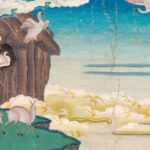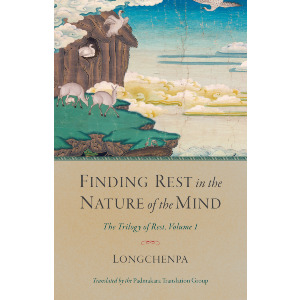We have excerpted the chapter “Impermanence” from Finding Rest in the Nature of the Mind: The Trilogy of Rest, Volume 1 here. Written in the fourteenth century, this text is the first volume of Longchenpa’s Trilogy of Rest, a work of the Tibetan Dzogchen tradition. This profound and comprehensive presentation of the Buddhist view and path combines the scholastic expository method with direct pith instructions designed for yogi practitioners.
1. So now you have your freedom, hard to find,
And yet its time is passing; it is subject to decay.
Look closely; see its hollowness like bubbling foam.
It is not worthy of your trust!
Think night and day upon the utter certainty of death.
2. This body is the ground of pain and every mental sorrow,
A plenteous wellspring of defiled affliction.
And yet you garland it with flowers,
Adorning it with robes and jewels.
But though you tend and wait on it
With many a tasty gift of food and drink,
At last it will not stay; it will decay and leave you.
You cherish now the future food
Of jackal, fox, and graveyard bird!
Don’t think of it as something permanent and clean,
But implement the holy teaching from this moment on.
3. Brahmā, Śiva, Indra, great and powerful gods,
Enjoy the greatest wealth in all the three dimensions of the world.
They blaze with glory through their merit and renown,
Yet in the contest with the Lord of Death
They have no victory.
Because they have achieved samādhi, they can live for aeons,
Yet when their karma is used up, their hour of death arrives.
Devas and asuras, rishis, those with magic power,
The rulers and the ruled—unnumbered are their births,
And not a single one without the fear of death!
4. This lifetime passes like the weeping clouds
Where dance the lightning garlands of the Lord of Death,
And from them, day and night, there falls
An endless rain to bathe the shoots
That grow in the three levels of existence.
5. The world and its inhabitants will pass.
The universe is formed and then destroyed
By seven fires, a flood, and then the scattering wind.
The all-encircling sea, the continents,
And even mighty Sumeru compounded of four jewels,
All girded by the rings of lesser peaks—all this will pass.
The time will come when all will have dissolved
Into a single space.
Remember this and practice Dharma from your heart.
6. The Guide and Guardian of the world,
Surrounded by a throng of the pratyekabuddhas, śrāvakas,
And all the bodhisattva offspring of the Lord,
Is like the peerless, hare-marked moon aloft in limpid skies,
Amid a host of starry constellations.
Clear, resplendent, radiant he shines,
And yet he is impermanent:
He demonstrates his passing to the state beyond all pain.
And see how the unbounded sun
Of his most precious Doctrine sets
And disappears as the generations pass.
Coreless like the plaintain tree,
This form of human flesh,
This mere illusion of a dwelling place,
How can it not decay and be destroyed?
7. Death therefore is sure;
Uncertain is its when and where and how.
This life is ever dwindling; no increment is possible.
Many are death’s circumstances;
Those that make life possible are few.
You have so little time to live!
Rein in your projects for the future—
Better far to strive in Dharma from this very instant!
8. This shelter built of the four elements,
Endowed with mind adorned with its inhabitants—
The thoughts that move—
Arises through conditions.
Thus it is compounded.
Being so, it is destructible.
Like a village crumbling down, it will not last.
Be swift to practice holy Dharma!
9. You’re momentary, ephemeral,
Aflutter like a flame caught in a gale.
When powerful dangers to your life descend,
You won’t last long; it’s certain you will die.
So practice holy Dharma right away.
10. Servants and possessions, friends both close and dear,
Your youth, your strength, your beauty, your good family—
You’ll lose them all; you must go forth alone.
But actions white and black, not left behind, will shadow you.
Other than the Dharma, there’s no other refuge at that time.
Why then do you not pass your time in diligence?
11. Think now about the past and future peoples of the world.
Of former generations countless beings have already passed,
And most of those who now are on this earth
Within a century’s time will surely be no more.
For those who follow after, it will be the same.
Look how they pass! The old and young have all an equal destiny.
From them you are no different in your nature.
Remember that your death is certain; practice Dharma!
12. Throughout the triple world, from hell until the summit of the world,
There is no place of safety from the Deadly Lord.
Everything is passing, changing, essenceless.
Nothing can be trusted; all is turning like a chariot wheel.
Especially this human state is plagued by many perils.
Disease and evil forces are the source of numerous ills.
Fire and sword, vast chasms, poisons, savage beasts,
And kings and robbers, enemies and thieves,
And all the rest destroy prosperity and life.
13. And even without harms, the lives of beings slip by,
Changing every second’s instant, night and day.
They drift toward the kingdom of the Lord of Death
Like rivers running to the sea
And like the round orb of the sun
That sets behind the western hills.
14. If food and all the good amenities of life
May be, like actual poisons, cause of pain,
How could goodness and perfection not be quenched by real adversity?
There is nothing that cannot become the cause of death.
And since its place and cause and time are all uncertain,
Rid yourself of all the futile and deceptive things pertaining to this life.
Sincerely practice Dharma:
This will help you in the moment of your death.
15. So now that you have found the boat of freedoms and advantages
That’s fitted with the rudder of a master’s teaching,
If now you do not strive to cross the stream of sorrow,
There is no self-betrayal more terrible than this!
16. Now you have attained a precious vessel,
Free of every defect, perfect, lauded by the Buddha.
If you do not store in it the riches of the twofold aim for self and others,
You will but bind yourself within the prisons of saṃsāra.
17. Alas, it is like giving teachings to a stone!
Most people in this world—
To think of them brings sorrow welling up!
They do not comprehend when taught,
And explanation brings no understanding.
Tomorrow death awaits them, but they think they’ll live forever.
Saṃsāra does not sadden them,
And of the will for freedom they have not the slightest trace.
If they have knowledge, they are arrogant.
If they have some understanding, it is all distorted.
They are borne away by busyness and pastimes
And are deluged by the rain of their defilement.
When might I be of help to them?
18. But you who wish to cross the ocean of your faults
Accomplishing the marvelous qualities of excellence,
In this very moment think about death’s certainty.
Meditate at all times, day and night, on your impermanence.
Cultivate repeatedly an attitude of sadness at saṃsāra,
And be determined to be free from it.
19. By this means you’ll implement the Teaching,
Useful, beneficial, for the present and for future lives.
You will strive in practice with a strong endeavor,
In your mind abandoning this life,
And bring to nothing the delusion of self-clinging.
All good qualities, in brief, will be achieved.
The cause of highest freedom and the halting of all defects
Is to think about impermanence,
Reducing projects for the future.
It is indeed the root of all the Dharma.
20. The minds of beings are wearied by defilement and distraction,
By clinging to phenomena they think are permanent.
Through this helpful teaching, deep and pleasing to the ear,
Resounding from the drum of Dharma clouds,
May their minds today find rest.
Finding Rest in the Nature of the Mind
$34.95 - Hardcover


